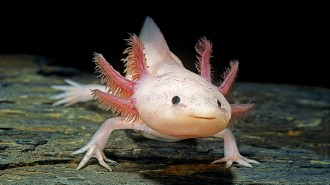Stones-Be-Gone: Gene-targeting drug restores chemical balance protecting the gallbladder
A drug that revs up a gene responsible for regulating gallbladder chemistry can prevent gallstones from forming, according to a mouse study.
Gallstones are made of cholesterol, a normal component of the bile stored in the gallbladder. The organ periodically pumps bile into the small intestine, where the fluid aids digestion of fats. Gallstones form when the cholesterol coalesces into crystals instead of remaining in solution. One in 10 people in the United States develops gallstones, which can be painful and occasionally life threatening.
Earlier research showed that the gene FXR is responsible for maintaining normal concentrations of bile salts, which are chemicals that keep gallbladder cholesterol dissolved. Now, using a gallstone-prone strain of mice, a team led by David J. Mangelsdorf of the Howard Hughes Medical Institute in Chevy Chase, Md., reports that a drug that stimulates FXR can prevent gallstones. The team’s study appears in the December Nature Medicine.
In their investigation, the researchers fed mice a high-cholesterol diet, which normally leads to gallstones. They also gave some of the mice an FXR-activating agent.
“The results were astounding,” says Mangelsdorf. “There wasn’t a trace of the disease in these guys.” By contrast, mice that didn’t get the drug developed gallstones within a week.
Currently, the only treatment for gallstones is surgical removal of the gallbladder and direct attachment of the bile duct from the liver, where bile is generated, to the small intestine. But surgery doesn’t solve the underlying problem: bile that is thick with microscopic crystals of cholesterol.
Thick bile can irritate the junction between the bile duct and the small intestine. It can also back up into, and inflame, the pancreas. In mice, the test drug not only prevented gallstones but also kept bile thin.
Using drugs to stimulate FXR and prevent gallstones “seems like a very good bet,” comments David D. Moore of Baylor College of Medicine in Houston, who is also studying the FXR gene.
Gary A. Churchill of the Jackson Laboratory in Bar Harbor, Maine, coauthored a 2003 report showing that differences in susceptibility of mice to gallstone formation correlate with variations in FXR. He cautions against embracing FXR-targeting drugs as a universal cure for gallstones, pointing out that there are other genes associated with the disease. “It would be naive to suppose that simply perturbing any one component will be appropriate to correct all cases,” he says.
A drug for people prone to gallstones is still years away, Mangelsdorf says. Toward that end, his team now plans to investigate whether susceptibility to gallstones can be explained by variations in FXR. If so, the problem could be treatable by drugs that target the gene, he says.







